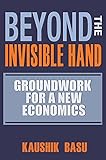Beyond the invisible hand : groundwork for a new economics /
By: Basu, Kaushik
Material type: BookPublisher: New Jersey : Princeton University Press, c2011.Description: xv, 273 p. ; 25 cm.ISBN: 9780691137162Subject(s): Economics | Economic policyDDC classification: 330.1 BA BE Online resources: Location Map
BookPublisher: New Jersey : Princeton University Press, c2011.Description: xv, 273 p. ; 25 cm.ISBN: 9780691137162Subject(s): Economics | Economic policyDDC classification: 330.1 BA BE Online resources: Location Map | Item type | Home library | Call number | Status | Date due | Barcode | Item holds |
|---|---|---|---|---|---|---|
| REGULAR | University of Wollongong in Dubai Main Collection | 330.1 BA BE (Browse shelf) | Available | T0041945 |
Includes bibliographical references and index.
One of the central tenets of mainstream economics is Adam Smith's proposition that, given certain conditions, self-interested behavior by individuals leads them to the social good, almost as if orchestrated by an invisible hand. This deep insight has, over the past two centuries, been taken out of context, contorted, and used as the cornerstone of free-market orthodoxy. In Beyond the Invisible Hand, Kaushik Basu argues that mainstream economics and its conservative popularizers have misrepresented Smith's insight and hampered our understanding of how economies function, why some economies fail and some succeed, and what the nature and role of state intervention might be. Comparing this view of the invisible hand with the vision described by Kafka--in which individuals pursuing their atomistic interests, devoid of moral compunction, end up creating a world that is mean and miserable--Basu argues for collective action and the need to shift our focus from the efficient society to one that is also fair. Using analytic tools from mainstream economics, the book challenges some of the precepts and propositions of mainstream economics. It maintains that, by ignoring the role of culture and custom, traditional economics promotes the view that the current system is the only viable one, thereby serving the interests of those who do well by this system. Beyond the Invisible Hand challenges readers to fundamentally rethink the assumptions underlying modern economic thought and proves that a more equitable society is both possible and sustainable, and hence worth striving for by scrutinizing Adam Smith's theory, this impassioned critique of contemporary mainstream economics debunks traditional beliefs regarding best economic practices, self-interest, and the social good.
